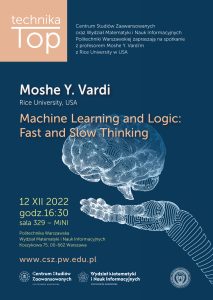Centrum Studiów Zaawansowanych oraz Wydział Matematyki i Nauk Informacyjnych Politechniki Warszawskiej zapraszają na spotkanie z profesorem Moshe Y. Vardi’m z Rice Iniversity w USA w ramach Seminarium środowiskowego „Systemy Inteligentne: teoria, praktyka, wyzwania” (http://syst-intel.mini.pw.edu.pl)
Tematem spotkania: „Uczenie maszynowe i logika: szybkie i wolne myślenie”. 
Data: poniedziałek, 12 grudnia 2022 o godz. 16:30,
Miejsce: Wydział Matematyki i Nauk Informacyjnych PW
……………..ul. Koszykowa 75 w Warszawie
……………..sala nr 329
W wydarzeniu można wziąć udział w dwojaki sposób:
przyjść do Sali nr 329 gdzie będzie wyświetlana prelekcja
bądź łącząc się bezpośrednio przez link:
https://zg-pti.webex.com/zg-pti/j.php?MTID=m6d4bb3207038af37420f38cbee003f70
Join by the webinar number
Webinar number (access code): 2733 368 0138
Webinar password: hJz6r3AgCJ2 (45967324 from phones)
Spotkanie odbędzie się w jęz. angielskim.
Więcej o spotkaniu:
Machine Learning and Logic: Fast and Slow Thinking
Prof. Moshe Y. Vardi, Rice University
https://scholar.google.com/citations?hl=en&user=DQaARsgAAAAJ
Computer science seems to be undergoing a paradigm shift. Much of earlier research was conducted in the framework of well-understood formal models. In contrast, some of the hottest trends today shun formal models and rely on massive data sets and machine learning.
A cannonical example of this change is the shift in AI from logic programming to deep learning.
I will argue that the correct metaphore for this development is not paradigm shift, but paradigm expansion. Just as General Relativity augments Newtonian Mechanics, rather than replace it — we went to the moon, after all, using Newtonian Mechanics — data-driven computing augments model-driven computing. In the context of Artificial Intelligence, machine learning and logic correspond to
the two modes of human thinking: fast thinking and slow thinking.
The challenge today is to integrate the model-driven and data-driven paradigms. I will describe one approach to such an integration — making logic more quantitative.
 Studies in English
Studies in English